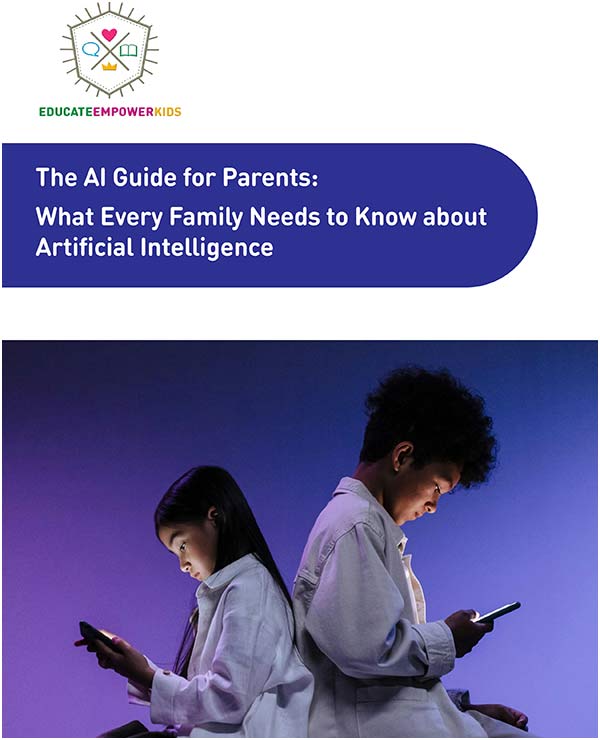By Mariana Pacheco
You’re coming home after a long day, the kids are running around the house, there’s toys everywhere, they’re hungry, the dishes are piled on the sink, and there’s still a few hours left before bedtime. At moments like this, it has become a common practice for parents to turn to smartphones and tablets as a way to keep kids entertained in order for them to be able to get things done. And keep their sanity intact.
Unfortunately, these “high-tech babysitters” may come with a high cost. According to a study done by the University of Foggia in Italy, it has been found that digital technology use can directly impact children’s brain functioning. This may result in higher levels of anxiety, anger, and aggression in children, since the overstimulation they get from the tiny screens depletes their mental energy which often results in explosive behavior (Limone, 2021).
If you’ve noticed that frustration, anger, and aggression have become more common in your child’s behavior, here are a few strategies that can help you:
Teach Your Kids to Understand and Identify Their Emotions
Help them become aware of their feelings. Children may need help understanding what they are feeling and what caused them to feel that way. When a child doesn’t understand their emotions, their frustration levels rise, and they might react by lashing out.
Help them name their feelings. Start out with simple ones, like: sad, angry, scared, and happy. Give them examples of when you’ve felt those feelings, and then ask them to give examples of times they’ve felt them. Once a child is able to recognize what they’re feeling, you’ll be able to introduce healthier ways to cope with these feelings.
Implement Calming-down Activities Throughout the Day.
Just like a pressure cook pan, it’s harder to control explosive behavior if your child has been keeping things inside. Giving them opportunities to vent and calm down throughout the day will help keep them in a more balanced state of mind. These can include drawing or painting, writing in a journal, playing an instrument, participating in sports, talking to someone they trust, reading a book, hugging, spending some time in nature, mindful breathing, and playing with playdough.
Cut down digital technology use. Early childhood is a time that is crucial for brain development, so everything we expose our children to has a lasting impact on the brain’s future functioning. Replacing smartphones and tablets with other activities will help prevent the negative impacts they have, while at the same time giving you a much deserved break. Here are a few ideas:
- Legos and/or Tinker Toys
- Cardboard building kits
- Puzzles
- Origami
- Clay/ Playdough
- Reading
- Word searches
- Coloring books
Being a great parent is hard work! There is so much going on, and it feels like the time we have to get things done only gets shorter, which makes technology seem like a simple way out when we need to entertain our kids. And regardless of the benefits technology can offer both us and our kids, knowing the impacts it may have on our children, how to deal with the side effects, and understanding that there are alternatives, can help us make better choices as we navigate this amazing adventure called parenting. How we handle moderating technology with our kids now will lay the foundation for them for years to come.
Talking about technology, limits, and how to best use phones can be overwhelming. Try Noah’s New Phone: A Story About Using Technology for Good to help you have great conversations! An engaging story with a super helpful workbook, Noah’s New Phone is a great investment in your kids’ futures! If you are looking for meaningful activities and positive discussions to build an amazing connection with your child, check out 30 Days to a Stronger Child.

Mariana Pacheco is a senior in Marriage and Family Studies student at Brigham Young University- Idaho. She’s married and has a 7 year old son and a 6 year old golden retriever. She has been working as a cultural educator for the past 4 years, where she teaches kids and teens social-emotional skills through stories, activities, art, and games.
Citations:
Limone, P., & Toto, G. A. (2021). Psychological and emotional effects of digital technology on
children in COVID-19 pandemic. Brain Sciences, 11(9), 1126.
Lök N., Bademli K., Canbaz M. (2017). The effects of anger management education on
adolescents’ manner of displaying anger and self-esteem: A randomized controlled trial. Arch Psychiatr Nurs. 32(1):75-81.




